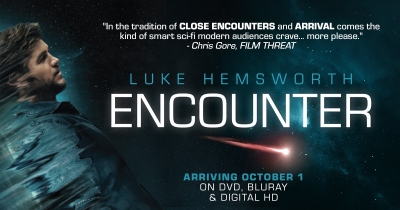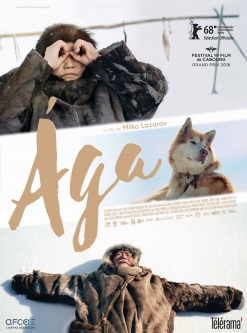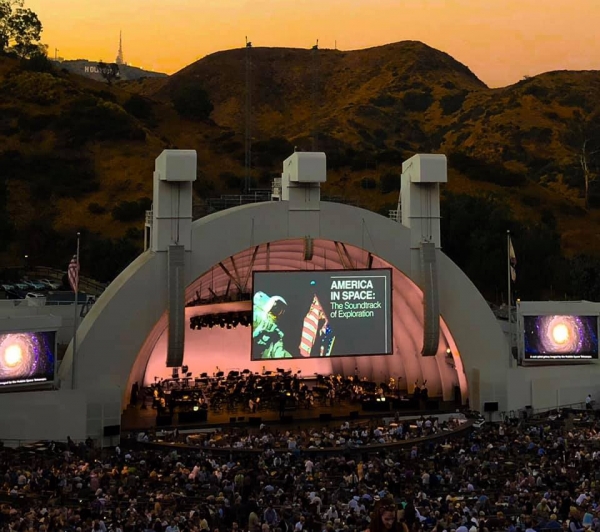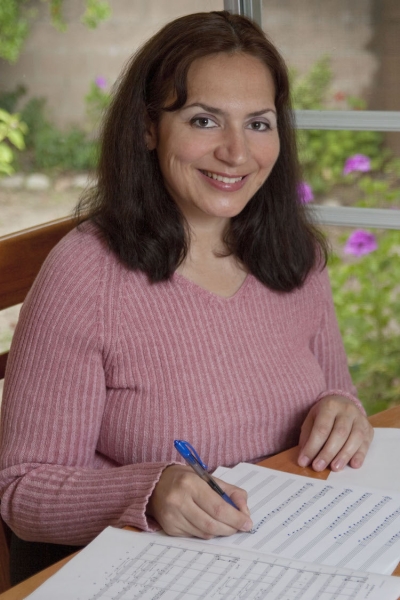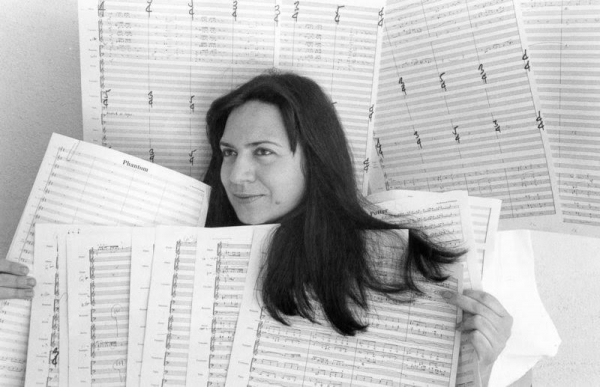Penka Kouneva is one of nine female film composers whose music will be featured in a very special multi-media presentation called “Women Warriors: The Voices of Change” on 9/20/19 at The Lincoln Center in NYC. A very talented and prolific composer, Penka’s music has also been featured in video games, virtual reality and television programs. She has recorded several albums, two of which I have reviewed, which is what put us back in touch after about 15 years. Enjoy getting to know Penka Kouneva!
KP: Hi Penka! We first connected back in 1999 when you were transcribing the late Laurie Z.’s Roots sheet music book and I was proof-reading it. You’ve done some really incredible things in the past 20 years, so it will be fun to catch up here!
PK: Yes! I had just moved to Los Angeles in February 1999 and Laurie Z. put me up. I slept on her sofa for a few weeks while looking for a place to rent.
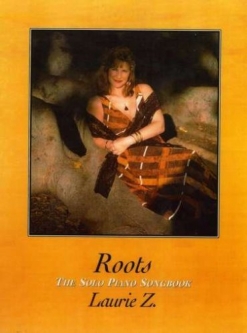
Click on book cover
to go to Kathy's review.
KP: Wow! I never knew that! Laurie had such a big heart - I still miss her a lot!
Congratulations on being a prominent part of the upcoming multi-media concert: “Women Warriors: The Voices of Change” at The Lincoln Center later this week! Tell us about it.
PK: The concert was conceived and created by conductor Amy Andersson. It tells the stories of trailblazing women via a silent documentary in 12 chapters with live orchestral accompaniment. Some of these women include Rosa Parks, Malala, RBG, the fighters at Standing Rock pipeline, Middle-Eastern women for peace, the #MeToo and #BlackLivesMatter movements, the AIDS crisis, and women fighting for environmental sustainability and for access to education for girls.
I scored six segments of the documentary: the chapters on the AIDS crisis in the 80’s, Standing Rock protests, international freedom fighters, the women of Israel and Palestine fostering peace, the #MeToo movement and the closing chapter celebrating the trailblazers.
KP: I sure wish I could be there and hope to be able to see and hear the concert at some point! I also interviewed Starr Parodi in conjunction with the concert. Do you know each other? If so, have you ever worked together?
PK: We are good friends. Starr and I worked together on the concert "Women Who Score," and also worked together on a recent concert featuring women composers. I’ve attended her
Pageant of the Masters show in Laguna Beach; it’s terrific.
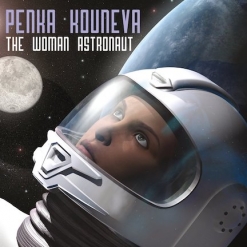
Click on album cover
to go to Kathy's review.
Click
here to go to
"The Woman Astronaut" on Spotify.
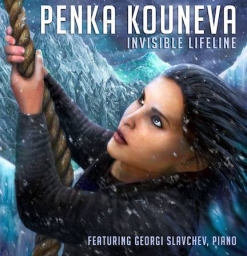
Click on album cover
to go to Kathy's review.
Click
here to go to
"Invisible Lifeline" on Spotify.
KP: You and I hadn’t been in touch much after Laurie Z.’s songbook until I reviewed your 2015 album, The Woman Astronaut. I was fascinated to learn that the music for that album was inspired in part by the fact that there are more women astronauts than there are women composers working on studio films. That’s pretty shocking! Is that statistic starting to change?
PK: Not really, because the latest NASA class includes 50% women astronauts while the studio features scored by women are still around 2%. It takes time …
KP: True, unfortunately. It really is surprising, though, that it is taking the film industry so long to catch up.
The music for The Woman Astronaut is very personal and autobiographical. Tell us a bit about your journey in film soundtrack work.
PK: The Woman Astronaut marked my beginning to seek composing jobs at the studio level and working with my inspiring mentor and manager, Victor Rodriguez. It was the most important passion project I’ve done to date. Later, it lead to scoring a $30 million NASA exhibit, Heroes and Legends, at the Kennedy Space Center, which then led to the Hollywood Bowl concert America in Space with the LA Philharmonic. LA Phil performed my score to a short documentary about women astronauts. The entire Bowl concert was my idea for celebrating the 50th anniversary of the moon landing, which I pitched to Michael Alexander (CalTech Director of Events) who, in turn, pitched it to LA Phil. I wanted to celebrate the moon landing by playing excerpts from Hollywood movies about astronauts with live orchestra.
KP: Wow! I hadn't heard about any of that! It’s fantastic that you were able to make it happen!
More recently, you released Invisible Lifeline (2018) which is based on the premise of: “If Frederic Chopin, Sergei Rachmaninoff, Clara Schumann or Alma Mahler were composing movie themes in the 21st century, what would their music sound like?” How did you come up with that idea?
PK: I mourn the loss of the unwritten music by women composers. Both Clara Schumann and Alma Mahler were exceptionally talented composers. Life got in a way and they quit composing. Clara was too distracted by her love for Brahms, her eight children (including one with mental illness) and her husband in a mental asylum. Alma Mahler’s husband prohibited her to compose; Alma was too distracted by her love affairs with other emotionally unstable artists. She also experienced the death of two of her children. I wonder … had they had opportunities to compose, what glorious music they could have written alongside the greats like Chopin and Rachmaninoff. To me, women’s unwritten music is a great loss for culture at large. So, I set out to write their “unwritten” symphonies ….
KP: I couldn't agree more! The women who tried to compose - even incredibly talented women - were not given any encouragement at all. Quite the opposite. It’s a tragic loss all over the world, really.
Both of your albums were on my Favorites lists for 2016 and 2018 and are absolutely incredible. I hope this interview will give them some more exposure!
PK: Thank you so much, Kathy!
KP: What are some of the films that you have written the soundtracks for?
PK: This fall (2019) four feature films I scored are getting released. Encounter, a sci-fi drama directed by Paul Salamoff is about a group of friends facing their fear of the unknown. The soundtrack and DVD are getting released in October. Another powerful family drama, Aga (dir. by Milko Lazarov), tells the story of an older Yakut couple in Siberia who yearn to reconcile with their estranged daughter. It was selected as Bulgaria’s submission in the 2020 Foreign Language Oscar race. The indie feature Blue (dir. by Gabriela Ledesma), tackling the subject of depression, is getting released. The fourth film, a supernatural thriller, Primrose Lane, involving time travel directed by Kathleen Davison will be released on DVD & VOD.
KP: You’ve been busy!
Much of your soundtrack composing has been for video games. Are there more women in that field than in film soundtrack work?
PK: Yes, there are a few prominent women composers for games in the USA (Laura Karpman, Sarah Schachner, Winifred Phillips) and UK (Jessica Curry) and even more in Japan, the country where video games first became mass entertainment.
KP: How did you get started in video game music?
PK: The Transformers composer, Steve Jablonsky, opened the doors to games. I was his orchestrator and knew his “sound” very well. When he needed help scoring Transformers in 2008, he invited me to audition. I scored a chunk of it. With this credit, and Prince of Persia: Forgotten Sands (which I co-scored with Jablonsky in 2009), I got a “break” in games and focused on fostering relationships in this exciting field. I built a game career from the ground up and had to reinvent myself as a game composer learning tons of new skills. In the end, becoming a game composer made me a better composer because I practiced writing memorable themes, solid structures and “interactive” composing.
KP: What are some of the games that you’ve scored?
PK: Recently, The Mummy VR and a handful of mobile and VR games (Rollers of the Realm, Meow Match, Dragon Strike). I also worked with Jablonsky on the beloved franchise Gears of War 2 and 3.
KP: You have also written music for a number of television shows. What are some of those?
PK: Recently I was invited by composer Joe Kraemer to co-score the prime-time TV show
Pandora – a SciFi-action-drama on the CW network. It was such a joyful experience. The show is like
Star Trek meets
Riverdale; it has a progressive vibe and a diverse cast.
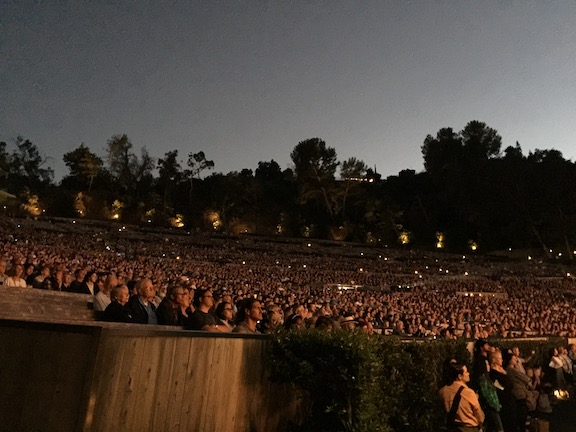
"America in Space" at the Hollywood Bowl.
KP: How do you score music for Virtual Reality?
PK: It’s scoring an immersive experience. Before film, I composed music for theater; this helped me understand and feel VR which is very visceral. You are right there, immersed in the experience which feels very real. The technical aspects of VR are complicated; I always work closely with my collaborators and adapt to the needs of the project.
KP: Do you have any favorites of your scoring projects?
PK: I’ve had fantastic collaborative experiences which I cherish. Usually my latest project is my favorite. I’ve had many highlights …. The NASA exhibit, Encounter, Pandora.
KP: Your own story is fascinating and very worthy of a documentary itself. Let’s backtrack a bit. Where were you born and where did you grow up?
PK: I was born in Bulgaria in 1967 and grew up with a music theory teacher mother and a scientist father. I also have two younger sisters. In 1990, I graduated from the Bulgarian National Academy with a degree in theory and received a composition fellowship for Duke University. At Duke, I studied with two renowned American orchestral composers, Stephen Jaffe and Scott Lindroth; they both were inspiring mentors. I received the first-ever doctorate in composition in a newly-established Ph.D. program and this helped me receive my green card. Once I had it in 1999, I arrived in Los Angeles to become a film composer.
KP: When did you start playing the piano?
PK: Around 5 years of age. I was fascinated by musical notation and began notating simple compositions for piano titled “Fish” and “Bunny in the Field.” The piano is my main instrument, and was my love and “friend” in my lonely adolescent years. Some of my most personal compositions are for the piano.
KP: How long did you take piano lessons?
PK: K- through 12th grade, and 4 years at the National Music Academy, but around age 19, my focus was composition and I thought of myself as a composer. I did get to play Liszt and Rachmaninoff and I can still play many Beethoven piano sonatas from memory.
KP: When did you start composing music?
PK: At age 12. My mother had a friend who produced kids’ theater shows for Saturday matinees. The producer thought it would be cute to have a girl pianist playing some music on stage. I wrote about 30 short piano pieces – incidental music for her theater show. Some were happy, others were sad. Some were fast, others were slow. This was my first foray into collaborative composing and writing a large number of short “cues.” And then performing them on stage on Saturday mornings over one season and getting paid 15 bucks per show. I began thinking of myself as a “composer” … at age 12.
KP: Are any of your family members musicians?
PK: My mother, Kina Prodanova, (now retired) is a music theory professor; her impact upon my musical development is profound.
KP: Do you play other instruments in addition to piano?
PK: Yes, simple violin…. But my other passion has always been the orchestra. My mother took me to tons of orchestral concerts. Ever since I heard Grieg’s Piano Concerto in A minor at age 6, I wanted to compose for the orchestra and create sweeping emotions and overwhelming passions like in that concerto. I studied many orchestral scores while still in high school. Later in Hollywood, becoming an orchestrator for some of the most luminous talents working today, namely Steve Jablonsky, Neal Acree and Nathan Barr, has been a deeply inspiring opportunity.
KP: How old were you when you decided to come to the US and what made you decide to come?
PK: I wanted to emigrate while still in high school, but this decision was solidified in my sophomore year at the National Academy because I was denied the opportunity to study composition. The Academy was a state-funded school; there were only two slots for composition students per year, and the administration did not want to “waste” one slot on a woman composer …. Although I had already won a few composing competitions, including the Grand Prix for a song in Japan, I did not study composition at the Academy. Later, the Japanese award opened the door to being accepted at Duke as a graduate composer. America has always been the land of the unlimited opportunities. At Duke, I had inspiring and nurturing mentors; the whole vibe was “sky is the limit.” I’ve always been a dreamer – fearless and unstoppable. I’ve had many bumps along my composer’s journey but I believe wholeheartedly in my destiny. It was my dream to become a film composer, and I followed my dream…. with a few hundred bucks and one computer.
KP: You're an inspiration, Penka! Did you have any contacts to help you get started in Hollywood?
PK: Yes, the composer Patrick Williams (also a Duke graduate) was my first mentor. He hired me as orchestrator on his TV movies. I’m deeply grateful to Pat Williams; I learned tons from him during a tough time when I had to reinvent myself from classical composer to film composer.
KP: How and when did you meet Laurie Z.?
PK: I met Laurie Z. at the TAXI Rally in 1998. She was looking for someone to transcribe her smooth jazz piano album, Roots. I transcribed her great music, and we became friends.
KP: Laurie did a concert at my house and several in the Bay Area when I was still there. She and I also became good friends and we always got together when she was in the area. I was so sad when she passed away. She left us some wonderful music, though!
Did you do a lot of transcription work while you were getting established in LA?
PK: In 1999 – early 2000’s I was working for Patrick Williams and Cliff Eidelman doing orchestration and music copying for their films. I was also proofreading the orchestrations of Conrad Pope.
KP: Who do you consider to be some of your musical influences?
PK: Classical composers – Bach, Beethoven, Brahms, Debussy and Durufle. Film composers –Jerry Goldsmith, Mychael Danna, Chris Young, Neal Acree. Rock music – Pink Floyd, and an indie band, Gomez. I am married to a music editor, Daniel Schweiger, who listens to one soundtrack every morning at 6:40 AM, so in 16 years I figure I have listened close to 6,000 soundtracks. The game soundtracks that really got me passionate about becoming a game composer were Bioshock by Garry Schyman and Uncharted 2 by Greg Edmonson. I have a very eclectic taste. Besides the composers I mentioned above, I was also very inspired by the medieval chant of Hildegard von Bingen and by EDM.
KP: Whew! That’s a dizzying assortment of influences!
What has been your most exciting musical moment to-date?
PK: Getting my score for Women Astronauts performed by The Los Angeles Philharmonic at the Hollywood Bowl in front of 18,000 enthusiastic attendees. The moon anniversary celebration at the Bowl happened on a night of a full moon and was magical. Over hundred of my friends attended and had a great time.
KP: What do you say to young composers asking for career advice?
PK: Over the years, I keep saying the same thing – develop your skills, become an awesome composer, cultivate a style, have something important to say. Network, foster friendships – we are in a business of people opening doors for the talents they champion. Over the years I’m realizing that being an artist is not a career. It’s destiny. It chooses you. Throughout my entire life I’ve been driven by passion and idealism. I was always intuitive and followed my heart. I was never concerned that there are 2% women film composers. Even if I knew the statistics before arriving in LA, I would have still wanted to become a film composer. I’ve been oblivious to the obstacles, which has made my journey thorny and financially precarious – but also joyful and filled with breath-taking, starry moments. But I’ve always been completely fearless. I hope I can inspire others to be courageous and to pursue their dreams.
KP: Very wise words! If you could have any three wishes, what would they be?
PK: 1. Great health. 2. To reverse the man-made global warming and save the earth. 3. To have a long life so I enjoy my loved ones and continue to be a musical storyteller.
Thanks so much, Penka, for taking the time to do this interview! For more information about Penka Kouneva and her music, be sure to visit
her website and her
Artist Page here on MainlyPiano.com.
Kathy Parsons
September 2019


